For more analysis download the Activity Evaluation report.
Activities
How the outcomes were achieved
- All activities
- New study options
- Additional Experiences
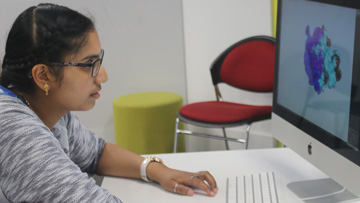 AMSPP collaboration
AMSPP collaboration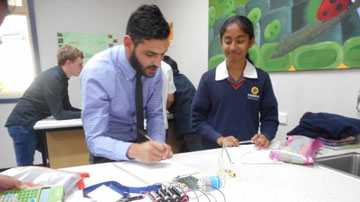 ASELL for Schools - Victorian Node
ASELL for Schools - Victorian Node Back to school
Back to school Communicating Science
Communicating Science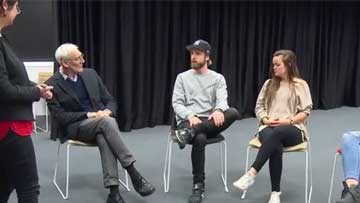 Contemporary Biology and Environmental Science In Education
Contemporary Biology and Environmental Science In Education Contemporary Science Schools Network
Contemporary Science Schools Network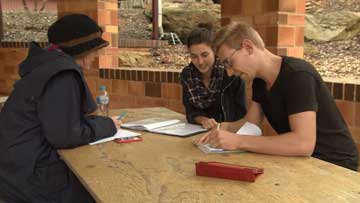 Discovery STEM initiative
Discovery STEM initiative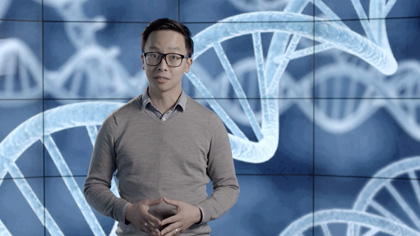 Maths videos
Maths videos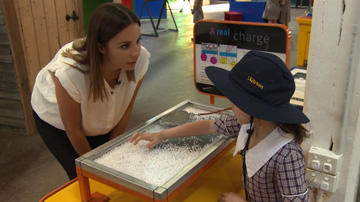 Multidisciplinary Science and Technology in Education collaboration
Multidisciplinary Science and Technology in Education collaboration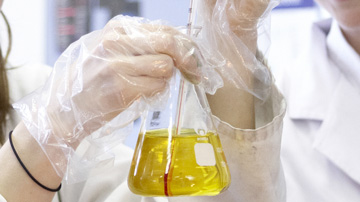 Reconceptualising Chemistry
Reconceptualising Chemistry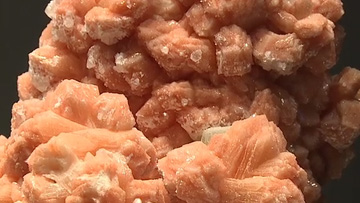 Reconceptualising Rocks
Reconceptualising Rocks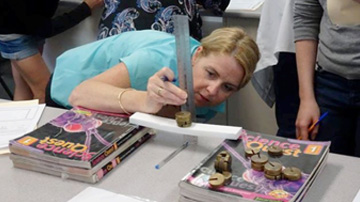 Representing scientific practice at the Institute for Frontier Materials
Representing scientific practice at the Institute for Frontier Materials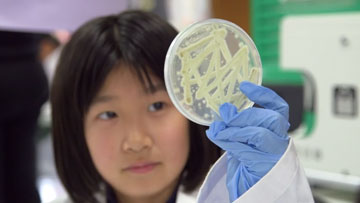 Scientists as Partners in Education
Scientists as Partners in Education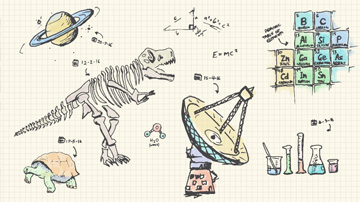 Science Squad
Science Squad
SCI3910 Schools Science Project
This new science elective at Monash University, created in collaboration with the Faculty of Education, aims to build a pathway for science teachers by giving undergraduate science students teaching experiences that will allow them to consider teaching as a career.
Contact
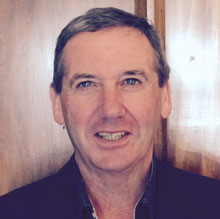
Responds to ReMSTEP innovation(s):
Undergraduate maths and science students engaging with schools.
Specialist science and technology centre collaborations.
Opportunities for students to interact with scientists in world-class research environments.
Key points
- New unit for science undegraduates commenced 2015
- Provided education workplace experience and exposure to teaching as a career
The Faculties of Science and Education collaborated to develop a new elective unit for second and third year Bachelor of Science students (SCI3910 Schools Science Project). The students research, develop, manage and deliver (teach) a science-based module that matches the learning outcomes specified to them by their client (supervising teacher).
SCI3910 aims to:
- provide a genuine and safe workplace experience for undergraduate science students, through which they can reflect on and further develop skills required for employment: effective communication, problem solving, developing new innovative ideas, learning new skills, working in teams, leading and motivating small teams, thinking on their feet and coping with the pressures of working in a professional environment where 'conditions' are constantly changing; and
- provide undergraduate science students with an opportunity to communicate their passion for science to school students, through engaging activities they develop and lead.
Enrolling in SCI3910 stemmed from my interest in science communication and toying with the idea of a career in education. I came to this realisation as I found teaching my peers to be incredibly rewarding. I hoped that placement would give me an insight into teaching as a career. I soon found teaching science can be surprisingly challenging, even at a grade 4 level. Students would often ask complex questions, which required us to repackage concepts into applicable terms to the child. Our communication skills have definitely improved as a result.
Prior to their school placement, students participate in a series of workshops. Effective practice was modeled by the Unit Coordinator during the workshops preceding the placements in schools. University science students had the opportunity to rehearse approaches during workshops and to undertake formative evaluation. There was much more emphasis on inquiry and collaborative practice with appropriate use of authentic contexts for learning. Undergraduate science students gained an understanding of the complexity associated with the communication of science to others (in an education setting, in relation to their future work places or more generally). The resultant approaches were applied in the classroom setting and evaluated by teachers providing undergraduate students the opportunity for immediate constructive feedback that they could respond to across the weeks of this experience and hence refine their understanding further.

Students are placed into schools to design and deliver science modules that are individually tailored to meet their client's (supervising teacher's) needs. Schools provide an ideal hands-on, supportive, professional place of work for the students to step out of their comfort zones and develop their communication, problem-solving, organisation, leadership skills, etc. The school environment provides a 'natural' place of learning, where mistakes are reflected on and opportunities to improve are provided regularly.
You are very much personally responsible. You can not just stay stand in front of the class unprepared and say sorry just give me a bad mark I am just going to cop this one on the chin. Like it really forces you to… have time management, you’re stuffed if you don’t deal with it. It puts you in this real-life situation when you genuinely have no choice and you totally have to be responsible.
Students have an introductory meeting with the school supervisor to establish a teaching brief. They also observe a session of the class they will teach to familiarise themselves with the context and audience for their delivery. They then research, experiment, plan lessons and develop teaching materials. Finally they deliver the lessons and reflect on what worked/did not work and why, and consider what changes need to be made for future classes and how their learning can be transferred into a future workplace.
It has just made me consider teaching as a career because, despite the fact that I hated lesson plans, actually getting into a classroom and feeling like allowing someone else to understand something that they otherwise wouldn’t have and seeing the progress even over just for lessons and then being really involved in not knowing that they could be so involved. That was really inspiring.
Undergraduate science students, some of whom are likely to become PSTs in the future, were able to practice and rehearse their skills and knowledge of science concepts by communicating them to various audiences. They also had the opportunity to put in practice enquiry-based teaching and learning approaches.

School teachers benefited from “fresh” science brought to their schools by the undergraduate students. The activities delivered by the undergraduate students provided professional development in situ for the teachers who learned new science and/or new ways of engaging children with science.
I personally think it is a great opportunity for us to learn much more stuff. Because teachers teach us stuff but having an actual scientist come in and teach us and show us, especially because they are older than us, is just a really good advantage for us. For when you grow up. It will be a good step for me when I have to go to college and all that.
Learn more
Footnotes:
- Photos courtesy Clayton North Primary School.
Sign up to our mailing list to stay informed

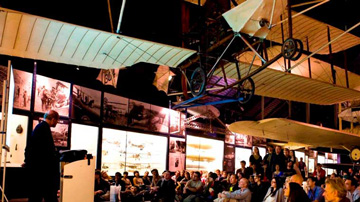 Engaging with practices of contemporary science
Engaging with practices of contemporary science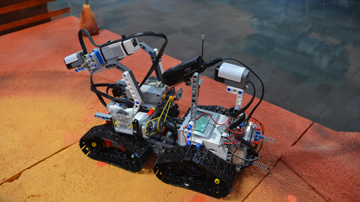 Inquiry science
Inquiry science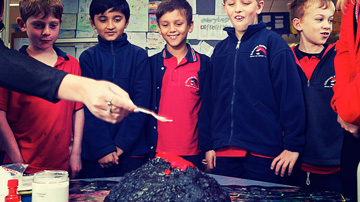 Schools science project
Schools science project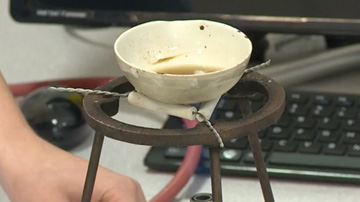 Science in Schools
Science in Schools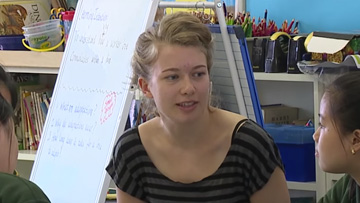 Science and mathematics specialist pathways
Science and mathematics specialist pathways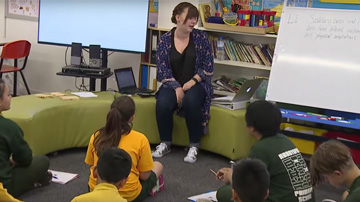 Science and Mathematics in the Classroom
Science and Mathematics in the Classroom